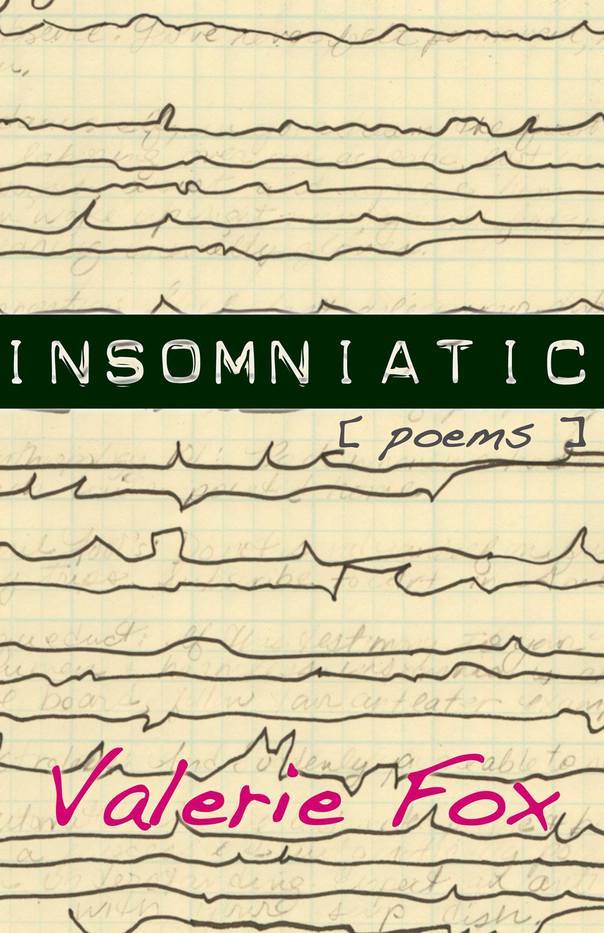ISSN: 1941-4137
POETRY THAT ENACTS THE ARTISTIC AND CREATIVE PURITY OF GLASS
POETRY THAT ENACTS THE ARTISTIC AND CREATIVE PURITY OF GLASS

Sara Pisak is a graduate student earning her MFA in creative nonfiction from Wilkes University. She is employed as a Contributing Editor at Helen: A Literary Magazine and a freelance writer/editor. Sara participates in the Poetry in Transit Program and has recently published work in the Deaf Poets Society and Five:2:One Magazine. When not writing, Sara can be found spending time with her family and friends. You can follow her writing adventures on Twitter: @SaraPisak10.
March 27, 2018
Edited by Stephanie Kaylor
Edited by Stephanie Kaylor
Review of Insomniatic by Valerie Fox
 Insomniatic
by Valerie Fox
PS Books, 2017
Don't sleep on Valerie Fox's newest work, Insomniatic (PS Books, 2017), a poetry chapbook. Fox's seamless blending of traditional poetic forms, prose poems, and erasure poetry will blanket a reader in the familiar as well as the unexplored. Each piece opens the door to exploration of the wake world and the dream world. Here readers will encounter the blending of these two worlds in which she creates a mirage like consciousness; where awake and dreaming are synonymous. In mirage like consciousness, the insomniac mind is discovered.
Insomniatic implores: If no two people see the world the same, how do these people view their dreams or the world through the distortion of not sleeping? The answer may seem simple: these two people still view their dream/insomniac world differently. How Fox answers this question, however, pushes further, as Fox creates a multi-voiced text, which changes based on the multi-structural format.
Fox's erasure poetry contains a distinct voice from her prose poems or traditional formed poetry, all which include their own individual speakers. Simply put, the enclosed erasure poetry shares the subject matter of "dreaming." The poem "If You Dream About," which serves as the cover of the text, is perhaps the most unique form included in the collection. The lined formation of the poem is suggestive of EEG brain waves recorded throughout a person's sleep cycle. While the poem contains a list of dreams, the inventive form allows for many interpretations and personalized reader experiences.
In the poem, "On Insomnia (Chapter 1)," insomnia is presented as the time when the sleep-deprived investigate the deepest corners of their minds to gather knowledge from their feverous thoughts. If insomniacs look closely, they might be surprised by what they find. Fox writes:
Many houses nowadays instead of having attics have crawl-spaces. There must be a reason. Even for curious children, attics are more fun than crawl-spaces. You can see what might be lurking in the attic, say a snake or a rat. But you can't see the spiders tumbling about in a crawl-space.
Fox postulates, in an insomnia fueled state, the sleepless never know what lurks in the crawl-spaces of their minds. In the daylight hours after a restful night, the human mind is an easy to see and understand "attic," where the spacious design leaves little room for surprises. However, with the sleepless hours stacking against the insomniac, the "crawl-space" of their minds hold surprising discoveries. It is the investigation of this intermediate, insomniatic world that highlights Fox's skill as a poet and the transcendent nature of the chapbook overall.
Another view of insomnia is presented in the poem, "I'll Come See You (response to Blok's "Angst")." The poem begins:
You, in my heart, introduced me to your bird
of fear and you became my own
feathery voice of God.
Don't mistake me though for your other
bird, your hallucinatory and detailed excuse
for not returning my mundane calls.
Following in poet Aleksandr Blok's footsteps, Fox incorporates ethereal, apocalyptic visions, creating the awe-inspiring in mundane everyday life. It is in the manipulation of Blok's style that Fox forges a piece which obscures the line between being awake and dreaming. Is this converging line between awake and dreaming a "hallucinatory" state or a separate entity where communication with ancestral oracles, like Blok, is possible? In her reconnaissance of this other world, Fox produces a chapbook unlike any other.
Reading Insomniatic is a personalized experience. The multi-voiced nature of the chapbook as well as the varying forms, create a habitable world where the dreaming mind and the waking mind link the text together in a stream of consciousness, reminiscent of the leaping thoughts of an insomniac. Get ready not be lulled to sleep, but plunged into a world of phantasms, discovery, and reveries.
Insomniatic
by Valerie Fox
PS Books, 2017
Don't sleep on Valerie Fox's newest work, Insomniatic (PS Books, 2017), a poetry chapbook. Fox's seamless blending of traditional poetic forms, prose poems, and erasure poetry will blanket a reader in the familiar as well as the unexplored. Each piece opens the door to exploration of the wake world and the dream world. Here readers will encounter the blending of these two worlds in which she creates a mirage like consciousness; where awake and dreaming are synonymous. In mirage like consciousness, the insomniac mind is discovered.
Insomniatic implores: If no two people see the world the same, how do these people view their dreams or the world through the distortion of not sleeping? The answer may seem simple: these two people still view their dream/insomniac world differently. How Fox answers this question, however, pushes further, as Fox creates a multi-voiced text, which changes based on the multi-structural format.
Fox's erasure poetry contains a distinct voice from her prose poems or traditional formed poetry, all which include their own individual speakers. Simply put, the enclosed erasure poetry shares the subject matter of "dreaming." The poem "If You Dream About," which serves as the cover of the text, is perhaps the most unique form included in the collection. The lined formation of the poem is suggestive of EEG brain waves recorded throughout a person's sleep cycle. While the poem contains a list of dreams, the inventive form allows for many interpretations and personalized reader experiences.
In the poem, "On Insomnia (Chapter 1)," insomnia is presented as the time when the sleep-deprived investigate the deepest corners of their minds to gather knowledge from their feverous thoughts. If insomniacs look closely, they might be surprised by what they find. Fox writes:
Many houses nowadays instead of having attics have crawl-spaces. There must be a reason. Even for curious children, attics are more fun than crawl-spaces. You can see what might be lurking in the attic, say a snake or a rat. But you can't see the spiders tumbling about in a crawl-space.
Fox postulates, in an insomnia fueled state, the sleepless never know what lurks in the crawl-spaces of their minds. In the daylight hours after a restful night, the human mind is an easy to see and understand "attic," where the spacious design leaves little room for surprises. However, with the sleepless hours stacking against the insomniac, the "crawl-space" of their minds hold surprising discoveries. It is the investigation of this intermediate, insomniatic world that highlights Fox's skill as a poet and the transcendent nature of the chapbook overall.
Another view of insomnia is presented in the poem, "I'll Come See You (response to Blok's "Angst")." The poem begins:
You, in my heart, introduced me to your bird
of fear and you became my own
feathery voice of God.
Don't mistake me though for your other
bird, your hallucinatory and detailed excuse
for not returning my mundane calls.
Following in poet Aleksandr Blok's footsteps, Fox incorporates ethereal, apocalyptic visions, creating the awe-inspiring in mundane everyday life. It is in the manipulation of Blok's style that Fox forges a piece which obscures the line between being awake and dreaming. Is this converging line between awake and dreaming a "hallucinatory" state or a separate entity where communication with ancestral oracles, like Blok, is possible? In her reconnaissance of this other world, Fox produces a chapbook unlike any other.
Reading Insomniatic is a personalized experience. The multi-voiced nature of the chapbook as well as the varying forms, create a habitable world where the dreaming mind and the waking mind link the text together in a stream of consciousness, reminiscent of the leaping thoughts of an insomniac. Get ready not be lulled to sleep, but plunged into a world of phantasms, discovery, and reveries.
Glass: A Journal of Poetry is published monthly by Glass Poetry Press.
All contents © the author.
All contents © the author.





